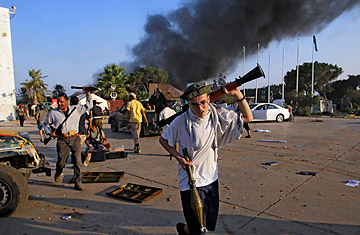
A rebel fighter carry a gun inside the main Moammar Gadhafi compound in Bab al-Aziziya in Tripoli, Libya, August 23, 2011.
Libya's National Transitional Council (NTC) is basking in the afterglow of its stunning conquest of Tripoli; but just two weeks earlier there were questions about its competence — and its transparency.
The Free Libya investigation into the death of one of the movement's leading generals was seen as a test of whether it can curb reflexes conditioned by four decades of Muammar Gaddafi's authoritarian society and transition to procedures based on the rule of law. The slow response of the NTC and the secrecy surrounding its investigation into the general's death, however, left many Libyans in rebel-controlled areas wondering whether their leaders are up to the challenge.
On July 28, Major General Abdel Fatah Younis was killed under mysterious circumstances after being questioned by a committee established to investigate him for reasons that remain unclear. He had been called back from the front for the interrogation in Benghazi, where the NTC has been based as it struggled against Gaddafi. The NTC has refused to explain why an arrest warrant was issued for Younis or how he died. It has said that it will only comment once the investigation into Younis' death is completed. "We will not discuss the details until the investigation is fully over," said military spokesman Colonel Ahmad Bani during a press conference on Aug. 17.
Many in Libya see the NTC's response as a stalling tactic, hoping that the rebels' recent military gains will diffuse the public's anger. "The council wants us to wait and wait. They think we will forget Abdel Fatah," said Mustafa Ali, 34, as he stood outside the courthouse where Benghazi residents gather nightly to talk and gossip. "But we won't forget our martyr. We want answers."
Answers from the NTC have been in short supply. The council's investigation has been marred by charges that not only is it not transparent but that members have not been forthcoming about their findings. In opting for secrecy over full disclosure, the NTC has further frustrated an already restless population. "Council members are finding it difficult to understand that the rules that existed under Gaddafi will no longer work," says Salah Sanussi, a political-science professor at Garyounis University. "People want more freedom. They want a more open government."
For many this means a government more accountable to the wishes of the people, even if it means censuring senior officials, something unheard of under Gaddafi. The NTC took steps in this direction when it dissolved the Cabinet on Aug. 8. The move, however, failed to placate the public. "The council thinks that by getting rid of a few minor figures we will be happy," moaned Abd al-Rahman Malik, 28, as he sat with friends outside a coffee shop watching a European soccer match. "But we want the big figures to pay for what happened."
Others believe dissolving the Cabinet was a ruse and that most of the ministers will return when the next one is formed — that it is a ploy to make it seem as if action is being taken, when, in the end, nothing will be done. "The council wants us to believe it is cleaning up the situation," said Muhammad al-Shuwaydi, 38. "But it can always bring these people back when people are no longer angry."
For their part, government officials are urging caution and patience. "We want to tell the truth," explained a judge involved in the investigation, who asked that his name not be used because he was discussing a sensitive topic. "But it takes time to perform such an investigation and it requires secrecy."
Some others agree, but say there is a limit to the public's patience. "It is true that the investigators need time," explains Ahmad Jani, a criminal-law professor in Benghazi. "But they are not only dealing with an investigation here. They need to take into consideration people's feelings. This is the trade-off of a democracy."
The NTC is struggling to understand this. Although society had blind faith in the council in the early days of the February revolution, it is becoming increasingly agitated with its tactics and is no longer willing to grant politicians carte blanche. Many, if not most, Libyans will be cheering the NTC in the days to come. But the time of testing will return once the cheering has stopped and hard work of governing begins.
